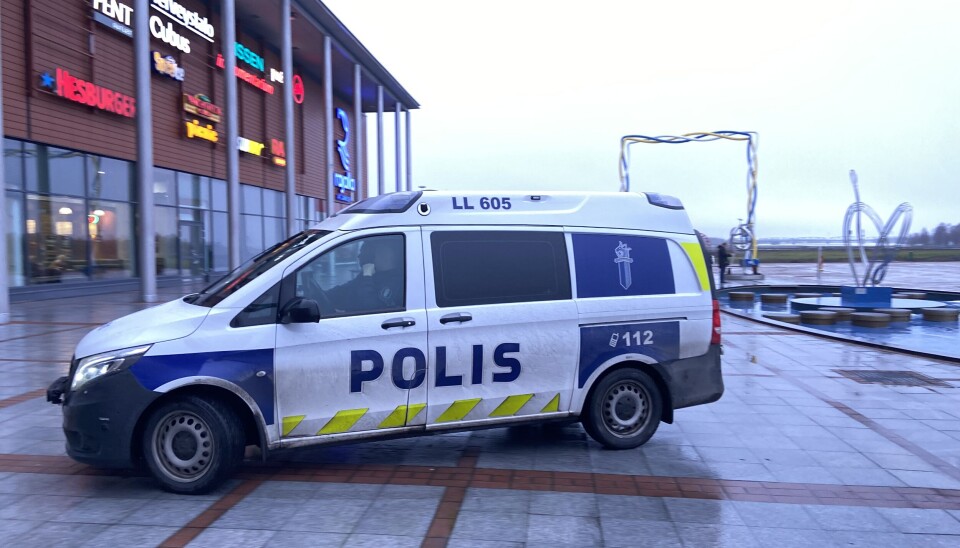
Finland, Sweden boost security in North with new police cooperation agreement
An agreement between Finland and Sweden to enhance police cooperation in their shared northern border areas officially came into effect on February 1. The new agreement aims to improve response times and prevent serious crimes in the northern border regions.
“The border area between Finland and Sweden is an exceptional state border region, where the community structure does not follow state borders (the Tornio-Haparanda area) and where cross-border interaction and cooperation are intensive in various areas of life,” Hannele Taavila, the Police Director in Finland told Eye on the Arctic.
“Finland and Sweden wanted to further enhance police cooperation, and for the aforementioned reasons, the northern municipalities were chosen as cooperation areas.”
Under the agreement, police from both countries will be allowed to cross the border under certain conditions to respond quickly to serious incidents or emergencies, including crimes like rape, aggravated assault, and homicide.
The cooperation will primarily affect the border areas of Finland and Sweden. In Finland, it will apply to the municipalities of Enontekiö, Kolari, Muonio, Pello, Tornio, and Ylitornio, while in Sweden, it will impact the municipalities of Haparanda, Kiruna, Pajala, and Övertorneå.

The agreement was approved by Finland’s President on May 17, 2024. After that, both countries gave their official approvals, and a government decree has now put the agreement into effect.
Police unions push for closer cooperation
Northern policing unions have long called for stronger cooperation to address the rising threat of organized crime, particularly in the North, where criminal groups can take advantage of the area’s unique vulnerabilities, including vast spaces, a sparse population, and a limited law enforcement footprint.
This agreement is just one of the building blocks toward better collaboration.
“Criminals don’t care about borders, they have connections everywhere, so we need to work together more efficiently,” Jonne Rinne, president of Finland’s police union, told Eye on the Arctic in an interview before Helsinki approved the agreement.
“We need to benchmark and share information with our colleagues across the Nordic region and Europe,” Rinne, who is also President of the European Confederation of Police, said.
“We don’t need to reinvent the wheel—we need to learn from each other, adapt, and act decisively.”
Earlier this winter, the police unions from Iceland, Denmark, Norway, Finland, and Sweden issued an explicit joint statement urging closer collaboration. They emphasized the need for a unified response especially in the face of increasing violence linked to gang crime in Sweden, which is now spilling over into neighboring countries.
“Today’s organized crime is capturing new markets for its drug and arms trade, human trafficking and prostitution, as well as serious economic and professional crimes,” the joint statement said. “No Nordic country is spared from this. Crime is spreading so widely, it is no longer possible for us to do our jobs in the old way.”
Language, use-of-force rules
The agreement is set to be implemented in 2026, after authorities complete the training for the participating police officers, during which Finnish and Swedish police will familiarize themselves with each other’s legislation and use-of-force rules.
Rinne acknowledged that, while the language issue may seem like an obstacle on the outside, Finland’s unique linguistic makeup presents a solution.
“Finnish and Swedish are both national languages in Finland, and we’ve all been taught Swedish in school and at the police academy,” Rinne said. “But what happens when you’re in a high-risk, high-stress situation and need to use a language that’s not your mother tongue? That can be a problem.”
However, Rinne noted that the issue can be addressed, particularly in Finland’s Lapland region, where bilingual officers who speak Swedish as their mother tongue and are fluent in Finnish are already in place.
Tackling violent crime in progress
Under the agreement, police from neighboring countries will be allowed to cross the border to prevent or interrupt serious crimes. This is particularly important in the Arctic, where the nearest police station may be located in the neighboring country rather than within the country where the crime is occuring.
Once the operation is underway, the host country’s police will take over and conduct the investigation.
“Cooperation will always follow the laws of the country where the operation is taking place,” Taavila explained.
“It’s important to remember that a police patrol from the other country, arriving at the crime scene under the agreement, will only take initial steps to prevent the crime. The host country’s police must always arrive at the scene to complete the operation.”
The precise implementation date for the agreement in 2026 will be announced in the coming months.
-----------
This story is posted on the Barents Observer as part of Eye on the Arctic, a collaborative partnership between public and private circumpolar media organizations.














